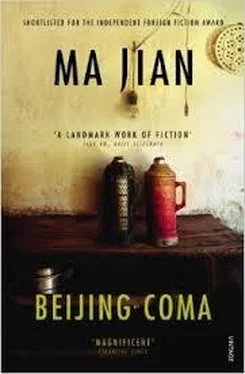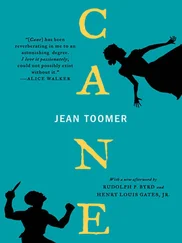Student marshals had detained two of the three culprits in a bus parked outside the Museum of Chinese History. When we squeezed inside it, we saw the two young men kneeling in the aisle.
‘These guys are called Yu Zhijian and Lu Decheng,’ said Zhuzi. ‘They’re not students. They’ve given us their ID cards. We have no legal right to interrogate them. All we can do is ask them questions.’
‘They have harmed the integrity and good discipline of our movement, and we must deal with them accordingly,’ Tang Guoxian barked, punching the wall of the bus. He was still as boisterous and loud as he’d been at Southern University, but since he’d joined the Provincial Students’ Federation, he’d lost his joviality. He’d become quite ruthless, too. Although Wang Fei had founded the Federation, he’d had him expelled on the grounds that he was studying in Beijing.
‘We should hold a press conference at once and make clear we have nothing to do with these men,’ Wu Bin said, flaring his triangular eyes. ‘Then we should hand them over to the police and let them deal with them.’
‘You came here to sabotage our movement and give the government an excuse to crack down on us,’ Wang Fei said, removing his glasses.
Yu Zhijian was the first to reply. He looked up and said, ‘Our action was no more radical than the slogans you’ve been shouting in the Square.’ His thick eyebrows buckled together in the middle of his unhappy, square face.
‘To be honest, I’ve often thought of doing something like that,’ Wang Fei said. ‘I’d love to assemble a big crowd and go and drag Mao’s body out of the Mausoleum. There are only two armed officers guarding the entrance. Tell us, who sent you here?’
‘It was our idea to do this,’ said Yu Zhijian. ‘No one put us up to it. We’re from Chairman Mao’s native province of Hunan. We wanted to express our anger at the crimes he committed against the Chinese people.’ He unzipped his beige blouson to let the sweat that had collected around the collar escape down his neck.
‘Would you like something to drink?’ Mou Sen said, squatting down. ‘I know your motives were good, but your actions might turn the people against us. Many of the citizens who’ve come out to support us have been holding up pictures of Chairman Mao. He’s still a hero to them.’
‘We wrote a statement expressing our views but you refused to broadcast it,’ Yu Zhijian said, passing a copy of it to Mou Sen. ‘That’s why we had to resort to direct action.’
‘Yes, I read it,’ said Mou Sen, handing the copy back to him. ‘We can’t broadcast any criticism of Mao now. We’re trying to keep the army back. The soldiers waiting to march into the city worship Chairman Mao. They’d go mad if they heard us criticise him.’
‘Do you know anyone here in Beijing who could verify your identities?’ Wang Fei asked, softening his tone a little. ‘How are we to know your ID cards aren’t forged?’
‘A Central Television reporter wants to do some interviews,’ Wu Bin said, stepping back into the bus.
‘Good,’ Tang Guoxian said, lighting a cigarette. ‘It will give us a chance to make clear we weren’t responsible for this act of vandalism.’ I’d never seen him smoke before. He seemed very anxious.
‘Go and speak to the Hunan students,’ Lu Decheng said. ‘Maybe one of them knows me.’ He was a short guy, with arched eyebrows and a thin goatee. The shirt under his black woollen slipover was grimy. He didn’t look like a government agent to me.
The Central Television reporter stepped onto the bus. Wu Bin checked his identity card and said officiously, ‘We can only spare you half an hour.’
Tang Guoxian walked over to Zhuzi and me and asked us to help organise a press conference.
‘We’re not a police force,’ Zhuzi said disapprovingly. ‘We have no right to arrest people. I think we should just let these guys go.’
‘Mao may have been a tyrant, but you shouldn’t have vandalised his portrait,’ Hai Feng shouted at the two men. ‘The government will treat us as enemies now. You’ve created a serious political incident here.’ His face was so contorted with anger he looked as though he was weeping.
‘This Square is a public forum,’ Yu Zhijian said. ‘Everyone should be free to come here and express their views. We were protesting against autocracy, like everyone else here.’
‘I’d like to start the interview,’ the reporter said, switching on his tape recorder. ‘Would you mind leaving us alone for a while?’
As we moved out of the bus, we heard the young man called Yu Zhijian explain in a thick Hunan accent what he and his two friends had done. ‘We arrived in Beijing the day before martial law was declared. We were excited to join the student movement, but soon became frustrated at the direction it was taking. The hunger strike didn’t achieve anything. We knew we’d have to use more radical tactics if we wanted to continue pushing for political reform. Our original plan was to take the portrait down, but it’s nailed very securely to the wall…’
‘That guy’s too pompous to be a government agent,’ I said, listening in from outside.
‘Can you call the journalists over, Mou Sen?’ Tang Guoxian asked as he stepped off the bus.
‘There’s no need for a press conference,’ Mou Sen said grouchily. ‘We should just issue a statement saying the students had nothing to do with this act of vandalism.’
‘Yes, we mustn’t blow this out of proportion,’ said Wang Fei, stamping his feet nervously, aware that he’d overreacted. ‘They did go a bit far, but they were right to attack Mao. He symbolises all that’s wrong with our country.’
Two men in their thirties walked up and said, ‘Hand those guys over to us. We’ll deal with them.’
I could tell at a glance that these were genuine government agents, but Tang Guoxian didn’t catch on. ‘Who are you?’ he said loudly.
‘We’re from the security office,’ one of them answered. ‘We should be handling this matter.’ He looked very much like the policemen who’d interrogated me in 1987.
‘Before we hand them over to you, we must make sure they have no connections with the student movement,’ Tang Guoxian replied.
‘You’re from the Tiananmen Police Station, aren’t you?’ I said. ‘I’ve had a lot of dealings with Inspector Zhang.’ Over the previous couple of weeks, I’d visited the local police station twice to discuss matters of security.
‘What’s your job?’ the government agent asked me brusquely.
‘I’m the Square’s deputy commander of security. I must ask you to be patient. We can’t afford to do anything that might jeopardise the safety of the students in the Square.’ I could tell my authoritative tone had successfully bridled them.
‘Well, you understand that this matter needs be sorted out, then,’ they said. Not wanting to continue the conversation any longer, they turned and left.
‘Now those are government agents,’ I said.
‘Maybe they’re all in it together,’ Tang Guoxian said, still misreading the situation.
‘We must ask the Headquarters what they think,’ Wang Fei said, running his hand through his hair.
‘You mean the Hunger Strike Headquarters? That disbanded ages ago!’ Tang Guoxian said, stepping back onto the bus.
Zhuzi and I went to the tent of the Beijing Workers’ Federation to see what they thought should be done.
It was sweltering hot. It must have been at least thirty-six degrees. The Square had no shelter and was paved in concrete, so on a hot day the heat became overwhelming. Most of the students had drifted off to the sides of the Square to cool down in the shade of the trees. Beijing residents who’d turned up to offer support or merely observe the passing scene wandered through the almost empty Square shielding themselves from the scorching rays with sunglasses, sun hats and umbrellas.
Читать дальше












